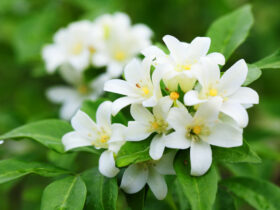Have you ever wondered what lavender really smells like? This well-known plant, famed for its calming properties, has a unique scent that is both refreshing and soothing. Lavender’s aroma is a complex symphony of sweet, floral, and herbaceous notes, making it a favorite in many households and products. Understanding the lavender smell can enhance your appreciation of this beloved plant. The scent of lavender is not just a sensory experience; it reveals the essence of tranquility and natural beauty. This article dives deep into the description of lavender’s scent, helping you grasp why it’s so cherished.
What Does Lavender Smell Like?
Lavender, a fragrant gift from nature, offers a scent that is as complex as it is captivating. This Mediterranean herb, beloved in gardens and perfumeries alike, presents a unique aroma that is both enchanting and soothing. At the heart of lavender’s scent lies a harmonious blend of floral, herbal, and evergreen woodsy notes, creating a symphony for the senses.
The fragrance is often described as a delicate balance of sweet and herbaceous tones, with a hint of earthy freshness reminiscent of a serene, sun-drenched landscape. The aroma of lavender is not merely a scent; it’s an experience, evoking images of sprawling lavender fields bathed in golden light.
Lavender Varieties and Their Unique Aromas
Among the hundreds of types of lavender, two stand out for their distinctive qualities: English lavender (Lavandula angustifolia) and lavandin (Lavandula intermedia). English lavender, celebrated for its superior fragrance, exudes a scent that is rich and elegantly floral.
Despite its exquisite aroma, it produces less oil compared to its cousin, lavandin. Lavandin, known for its high camphor content, offers a more robust and slightly sharper fragrance. Together, they form a symphony of scents, each contributing its own unique notes to the lavender family.
The History of Lavender Cultivation
Lavender’s journey from the sun-drenched Mediterranean to gardens worldwide is as rich as its aroma. This herb’s story began in ancient times, flourishing under the warm sun and in the stony, well-drained soils of the Mediterranean region. Over the centuries, lavender has traversed continents, finding new homes in various microclimates globally.
Despite its widespread cultivation, France stands as the epicenter of lavender production, famously producing vast quantities of this cherished plant. Lavender belongs to the Lamiaceae or mint family, yet its scent sets it apart from its relatives like basil, thyme, and mint. Its captivating aroma, tied to its historical roots and cultivation, adds depth to its character and allure.
Extraction and Use of Lavender Essential Oil
The allure of lavender extends beyond its visual beauty to the essence extracted from its flowers. The process of extracting lavender essential oil is a blend of tradition and modern technology. It involves steam distillation of the lavender flowers, a method that preserves the integrity of the aromatic compounds. This high-temperature process allows for the extraction of a significant percentage of oil, capturing the essence of lavender in its purest form.
Once extracted, lavender oil becomes a versatile player in the world of fragrances and aromatherapy. Its use ranges from perfumes and scented candles to therapeutic applications, where it’s prized for its calming and soothing properties. The essential oil of lavender, with its distinct and beloved scent, continues to be a staple in the fragrance industry, enchanting users with its timeless aroma.
The Benefits of Lavender: Lavender’s Soothing Effects on Mind and Body
The fragrance of lavender is not just pleasing to the senses; it’s a balm for the mind and body. Studies have shown that the scent of lavender has profound soothing effects, capable of reducing anxiety, depression, and even stress. It’s also shown to have anti-inflammatory, antimicrobial, and antioxidant effects, among others. This calming property is not just folklore; it’s backed by science, making lavender a go-to choice for relaxation and stress relief.
Lavender’s ability to soothe extends to improving sleep quality. Its gentle aroma is often used in bedtime routines, helping people fall asleep faster and enjoy deeper, more restorative sleep. The scent of lavender creates an atmosphere of tranquility and peacefulness, ideal for unwinding after a long day.
More health benefits of lavender include:
- Medicinal Properties: Lavender essential oil is known for its antimicrobial, anxiolytic (anxiety-reducing), anti-inflammatory, antinociceptive (pain-relieving), and antioxidant properties.
- Applications in Dentistry: Lavender essential oils have potential uses in dentistry, such as treating local infections, reducing dental anxiety, preventing biofilm formation on teeth, and as an alternative to synthetic materials.
- Composition and Properties: Lavender oil contains components like linalool and linalyl acetate, contributing to its antimicrobial and other health benefits.
- Anxiolytic Effects: Lavender’s fragrance has been extensively researched for reducing anxiety, including in dental settings, by affecting serotonin neurotransmission.
- Antinociceptive and Anti-Inflammatory Properties: Lavender oil shows potential in pain relief and reducing inflammation, offering an alternative to non-steroidal anti-inflammatory drugs.
- Soothing Fragrance: The scent of lavender has proven soothing effects, reducing anxiety, depression, stress, and improving sleep quality.
The Scent of Lavender in Modern Products and Perfumes
Lavender’s timeless scent has found its way into the heart of modern beauty and home products, transcending traditional uses. Its universal appeal has made it a trendy ingredient in a range of items. In the realm of perfumery, lavender adds a classic yet fresh dimension, lending its floral and herbaceous notes to both sophisticated and casual fragrances.
The versatility of lavender also shines in home care products. Scented candles, room sprays, and diffusers carrying the lavender aroma transform living spaces into havens of calm and relaxation. The inclusion of lavender in soaps, lotions, and bath products brings a spa-like experience into daily routines, making self-care moments more luxurious and soothing.
In the ever-evolving world of scents, lavender maintains its status as a beloved and sought-after fragrance. It continues to captivate with its unique blend of freshness and tranquility, making it a staple in both classic and contemporary products.
The Use of Lavender Fragrance in Candle Making
The use of lavender in candle-making encapsulates the essence of this aromatic herb, bringing its calming and soothing properties into homes. Lavender candles are not just about the scent; they’re about creating an ambiance that promotes relaxation and serenity. When lit, these candles release the gentle, soothing aroma of lavender, transforming any space into a tranquil sanctuary.
Lavender’s natural ability to alleviate stress and promote relaxation makes it a preferred choice for evening routines. Lighting a lavender candle can signal the mind and body to unwind, setting the stage for a peaceful night’s rest when coupled with the health benefits of candles. The warm glow and the soft, floral fragrance create a cozy, comforting atmosphere, ideal for meditation or a relaxing bath.
In addition to their therapeutic benefits, lavender candles are also a stylish and elegant addition to home décor. They often come in a variety of designs and sizes, fitting seamlessly into different interior styles. The popularity of lavender in candle-making reflects its enduring appeal and effectiveness in enhancing well-being through scent. Its popularity also makes it easy to buy high-quality candles in this timeless scent.
Embracing the Serenity of Lavender’s Scent
The enchanting smell of lavender has been a topic of delight and curiosity. It’s more than just a pleasant aroma; it’s a journey through a sensory garden. This article has explored the unique characteristics of lavender’s smell, from its sweet floral notes to its subtle herbaceous undertones. Understanding the smell of lavender not only deepens our appreciation of this plant but also connects us to its history. As we conclude, remember that the fragrance of lavender is a timeless symbol of relaxation and peace.
Frequently Asked Questions (FAQ) About Lavender
What exactly does lavender smell like?
Lavender’s scent is a unique blend of floral, herbal, and slightly woodsy notes. It is often described as fresh and calming, with a sweet, slightly earthy aroma. The fragrance can vary slightly depending on the lavender species, but it generally possesses these characteristic qualities.
Are there different types of lavender scents?
Yes, different lavender species have subtle variations in their scents. For example, English lavender is known for its sweet, floral fragrance, while lavandin has a sharper, more camphor-like scent. These variations contribute to the diverse range of lavender scents available.
How does lavender affect mood and relaxation?
Lavender is renowned for its calming properties. Its scent has been found to reduce stress, alleviate anxiety, and promote a sense of relaxation and well-being. This makes it a popular choice for use in aromatherapy and relaxation practices.
Can lavender scent improve sleep quality?
Yes, the scent of lavender is known to aid in improving sleep quality. It helps to relax the mind and body, making it easier to fall asleep and enhancing the depth and restfulness of sleep.
Why is lavender commonly used in candles and home fragrances?
Lavender is used in candles and home fragrances for its soothing and pleasant scent, which has the ability to create a peaceful and relaxing atmosphere. It’s also popular due to its versatility and compatibility with a variety of other scents.
Is lavender scent suitable for everyone?
While lavender is generally well-received, scent preferences are subjective, and some individuals may find it less appealing. Additionally, people with certain allergies or sensitivities should be cautious when using lavender-scented products.
How does lavender in perfumes differ from its natural scent?
In perfumes, lavender may be combined with other scents, which can alter its natural fragrance. Perfumers often blend lavender with citrus, floral, or woody notes to create a more complex scent profile.
Can growing lavender at home provide the same scent benefits?
Growing lavender at home can provide similar scent benefits. The natural fragrance of live lavender plants can enhance the ambiance of a space, offering a fresh and authentic lavender scent.





